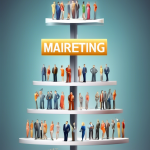Strategies for Creating Content with AI: Harnessing Technology for Engaging Material
Artificial intelligence (AI) is revolutionizing how we create content, offering innovative approaches to engage audiences and enhance productivity. Writers of all backgrounds can harness AI to streamline their processes while maintaining a focus on quality. Here are some powerful strategies to tap into AI’s potential for crafting compelling content.
Understanding Your Audience
Before diving into content creation, it’s crucial to understand who you’re writing for. AI tools can analyze audience behavior and preferences, helping you determine interests and pain points. Here’s how you can leverage AI:
- Data Analysis: Use AI algorithms to sift through large amounts of data and identify patterns.
- Sentiment Analysis: Tools can assess how audiences feel about certain topics, guiding your content direction.
- Segmentation: AI can assist in creating audience segments, allowing you to tailor messages for different demographics.
Generating Ideas
Coming up with fresh content ideas can be a challenge, but AI can alleviate this stress. By utilizing AI-driven tools, you can generate a wealth of creative topics:
- Topic Generators: AI tools can suggest trending topics based on user searches and social media activity.
- Content Gaps: Analyze competitor content to find missing angles that you can fill.
- Brainstorming Sessions: Use AI to create mind maps or brainstorming sessions, triggering new thoughts and angles.
Content Creation
Once you’ve gathered insights and ideas, it’s time to create your content. AI can assist you in various ways to ensure your material is not only engaging but also optimized for performance:
- Writing Assistance: AI tools like Grammarly or Jasper can help refine your writing, improving grammar and style.
- Text Generation: Certain models can generate human-like text to jumpstart your writing process, saving you time and effort.
- Plagiarism Checks: Ensure your content is original using AI-powered plagiarism detection software.
SEO Optimization
Creating engaging content goes hand in hand with optimizing it for search engines. AI helps streamline SEO processes in the following ways:
- Keyword Research: AI tools can analyze search trends and help identify high-impact keywords.
- Content Structuring: Optimize your layout by suggesting internal links, headings, and meta descriptions.
- A/B Testing: AI can analyze which headlines, CTAs, and layouts perform better, allowing you to refine your content continuously.
Content Distribution
After crafting your content, effective distribution is essential to reaching your audience. AI can enhance this process significantly:
- Social Media Post Scheduling: tools can determine optimal posting times for maximum engagement.
- Audience Targeting: Use AI to identify specific segments that will resonate most with your content.
- Performance Tracking: AI analytics can track how well your content performs across various channels, providing insights for future improvements.
Iterative Improvement
Content creation doesn’t end once a piece is published. Regularly updating and improving your content is crucial, and AI can assist in this process:
- Content Audits: Regularly use AI to assess the performance of your existing content, identifying what’s working and what isn’t.
- Feedback Integration: Analyze user comments and engagement metrics to understand audience responses.
- Content Refresh: AI can recommend changes to existing pieces based on current trends and audience interests.
In today’s rapidly evolving digital landscape, integrating AI into your content creation strategy allows for more engaging, relevant, and effective material. By understanding your audience, generating ideas, optimizing for search engines, and distributing intelligently, you position yourself for success. Embrace AI, and let technology refine your creative efforts for a brighter content future.
The Ethical Implications of Using AI in Content Creation: Navigating the Balance Between Automation and Authenticity
The world of content creation is evolving rapidly, with artificial intelligence (AI) playing a pivotal role. As creators increasingly leverage AI tools to streamline their workflows and generate ideas, a fundamental question arises: what are the ethical implications of using AI in this process? Navigating the delicate balance between automation and authenticity becomes essential for those who wish to maintain integrity while benefiting from technological advancements.
One primary concern lies in the authenticity of AI-generated content. When machines take the reins, traditional notions of originality and personal expression may be compromised. Readers often seek a human touch in articles, blogs, and creative works, craving emotional connections and genuine insights. If AI produces content that lacks the nuance of human experiences, will audiences begin to distrust the very medium they’ve turned to for information? The risk is real, especially when readers can’t distinguish between human and machine-generated content.
Moreover, the risk of misinformation is another pressing ethical challenge. AI tools can curate content and generate narratives based on large datasets, but these inputs are not infallible. When relying on AI, creators must be vigilant about the sources from which their content is derived. To ensure accuracy, creators can follow these steps:
- 1. **Verify Sources**: Always cross-check the facts against reputable and authoritative references.
- 2. **Maintain Transparency**: If content is AI-generated or assisted, disclose this in a responsible manner.
- 3. **Evolve with AI**: Stay updated on AI’s developments in content creation, and adapt your strategies accordingly.
Ethical considerations also extend to the creative process itself. Many content creators worry that the increasing use of AI could devalue their work. If algorithms can generate quality content, will the skill and craft of writing be overshadowed? It’s crucial for creators to carve out their unique voice, blending automation with their own insights to produce work that resonates deeply with their audience.
Additionally, the issue of copyright raises significant ethical questions. Who owns the content produced by AI? Is it the programmer, the user, or the AI itself? As AI takes on more significant roles in crafting narratives, these questions become more complex. Users should familiarize themselves with copyright laws and be proactive in ensuring that their content adheres to legal standards. This could involve:
- 1. **Understanding Licensing Agreements**: Familiarize yourself with the terms of service of AI tools.
- 2. **Educating Yourself on Copyright Laws**: Stay informed about emerging discussions on copyright in the digital age.
- 3. **Collaborative Attribution**: Always give credit where it’s due, acknowledging both human and AI contributions.
Another vital aspect to consider is the potential for bias in AI-generated content. Machine learning algorithms are trained on existing data, which means they can inadvertently perpetuate existing biases present in that data. For example, if an AI tool is trained predominantly on data reflecting a particular demographic, the content it generates may lack diversity in voice and perspective. To combat this, creators must actively curate their input data and strive for inclusivity in their content.
As AI technology continues to advance, the question of accountability becomes increasingly significant. If AI generates harmful or misleading content, who is responsible? Building ethical frameworks around AI utilization in content production is paramount. Creators, developers, and stakeholders should engage in open conversations to establish guidelines that promote responsible usage of AI tools.
As we embrace the integration of AI in content creation, it’s vital to prioritize authenticity and build relationships with audiences. This means using AI not as a crutch but as a collaborative tool. Engaging with ethical implications allows creators not only to enhance their work but also to contribute positively to a rapidly changing landscape.
Ultimately, while AI enhances efficiency and opens new creative avenues, it’s the human touch that will always matter. Striking the perfect balance between automation and authentic expression will help retain trust in content creation, ensuring it serves both the creators and the audience in meaningful ways.
Conclusion
As we navigate the remarkable intersection between technology and creativity, it becomes increasingly clear that the act of creating content with AI is not only transformative but also essential in today’s digital landscape. By leveraging strategies designed to harness the power of artificial intelligence, content creators can produce engaging and high-quality materials that resonate deeply with their audiences. From generating fresh ideas to streamlining content workflows, AI tools offer a multitude of opportunities that enrich the creative process while enabling writers to focus on what truly matters—building genuine connections with their readers.
Implementing practical strategies for utilizing AI in content creation can amplify productivity and enhance the overall quality of the output. For instance, employing AI-driven platforms and tools can provide valuable insights into trending topics, audience preferences, and keyword optimization, enabling writers to craft content that is not only relevant but also highly engaging. Additionally, AI allows for the automation of routine tasks, which ensures that creators can allocate their time and energy towards more strategic decisions, ultimately resulting in a richer, more coherent message that appeals to readers.
However, the integration of AI in content creation raises a crucial discussion about the ethical implications of automation versus authenticity. As writers and marketers seek to enhance their production capabilities, it is imperative to remain vigilant about preserving the human touch that makes content relatable. Automation should not come at the expense of creativity and connection. Striking a balance is essential—embracing AI as a powerful tool while ensuring that the end product retains genuine storytelling.
It is vital to recognize that AI can assist in producing content, but it should not replace the unique perspectives and narratives that come from human experience. Authenticity is the lifeblood of resonant communication. Readers can often discern when content feels mechanical or disingenuous, which can undermine trust and engagement. Therefore, successful content creation with AI involves a thoughtful approach that prioritizes ethical considerations alongside technological advancements.
This balance can be achieved by collaborating with AI rather than relying on it as a sole creator. Writers can use AI-generated drafts as a foundation, infusing their personal anecdotes, insights, and emotional intelligence to create a final product that echoes their unique voice while benefiting from the efficiency that AI provides. This synergy between creator and machine enhances the ability to maintain authenticity while leveraging the innovative aspects of modern technology.
Moreover, ongoing education and awareness regarding the ethical dimensions of AI in content creation are necessary for responsible usage. Writers, marketers, and organizations must cultivate a mindset of continuous improvement, regularly evaluating their practices and the impact of AI-generated content. Establishing guidelines that prioritize ethical considerations while implementing AI will help ensure that content not only engages but also educates and uplifts readers.
Beyond just the act of writing, creating content with AI sets the stage for a broader conversation about the future of communication. As technology continues to evolve, so too will the expectations of audiences who seek authentic, compelling narratives. By remaining committed to ethical practices, content creators can confidently navigate the complexities of AI implementation. They can establish themselves as thought leaders who appreciate innovation while upholding the deeply human elements of storytelling.
The journey of adapting to an AI-enhanced landscape of content creation poses numerous challenges and triumphs. As technology accelerates the pace of change, those who embrace this evolution with discernment and creativity will thrive. The key to success lies in the commitment to authenticity, the ethical use of AI, and a dedication to addressing the ever-changing needs of audiences.
By focusing on creating content with AI thoughtfully, writers can pave the way for enriched storytelling and dynamic engagement. The future of content creation is bright, especially when we meld the ingenuity of human creativity with the precision of AI technology, ensuring that our communications remain robust, relevant, and deeply connected to the readers we aim to engage. The possibilities are expansive, and as we embrace this modern age of content creation, we must be both the architects and the guardians of ethical practices that elevate the content that shapes our world.


